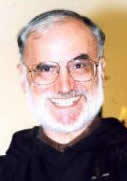Then suddenly there is a noise, the engine starts to work, the car moves on its own and the people who were pushing it straighten themselves up and breathe a sigh of relief.
This is an image of what happens in Christian life. One goes forward with much effort, without great progress. But we have a very powerful engine ("the power from above!") that only needs to be set working. The feast of Pentecost should help us to find this engine and and see how to get it going.
The account from the Acts of the Apostles begins thus: "When the time for Pentecost was fulfilled, they were all together in the same place."
From these words, we see that Pentecost pre-existed Pentecost. In other words, there was already a feast of Pentecost in Judaism and it was during this feast that the Holy Spirit descended. One cannot understand the Christian Pentecost without taking into account the Jewish Pentecost that prepared it.
In the Old Testament there were two interpretations of the feast of Pentecost. At the beginning there was the feast of the seven weeks, the feast of the harvest, when the first fruits of grain were offered to God, but then, and certainly during Jesus' time, the feast was enriched with a new meaning: It was the feast of the conferral of the law and of the covenant on Mount Sinai.
If the Holy Spirit descends upon the Church precisely on the day in which Israel celebrated the feast of the law and the covenant, this indicates that the Holy Spirit is the new law, the spiritual law that sealed the new and eternal covenant. A law that is no longer written on stone tablets but on tablets of flesh, on the hearts of men.
These considerations immediately provoke a question: Do we live under the old law or the new law? Do we fulfill our religious duties by constraint, by fear and habit, or rather by an intimate conviction and almost by attraction? Do we experience God as a father or a boss?
I conclude with a story. At the beginning of the last century a family from southern Italy emigrated to the United States. Not having enough money to pay for meals at restaurants, they took bread and cheese with them for the trip. As the days and weeks passed the bread became stale and the cheese moldy; at a certain point their child could not take it anymore and could do nothing but cry.
The parents took the last bit of money that they had and gave it to him so that he could have a nice meal at a restaurant. The child went, ate and came back to his parents in tears. The parents asked: "We have spent all the money we had left to buy you a nice meal and you are still crying?"
"I am crying because I found out that one meal a day was included in the price and this whole time we have been eating bread and cheese!"
Many Christians go through life with only "bread and cheese," without joy, without enthusiasm, when they could, spiritually speaking, every day enjoy every good thing of God, it all being included in the price of being Christians.
The secret for experiencing that which John XXIII called "a new Pentecost" is called prayer. That is where we find the "spark" that starts the engine!
Jesus promised that the heavenly Father would give the Holy Spirit to those who asked for him (Luke 11:13). Ask then! The liturgy of Pentecost offers us magnificent words to do this:
"Come, Holy Spirit ...
Come, O Father of the poor,
Ever bounteous of Thy store,
Come, our heart's unfailing light.
Come, Consoler, kindest, best,
Come, our bosom's dearest guest,
Sweet refreshment, sweet repose.
Rest in labor, coolness sweet,
Tempering the burning heat,
Truest comfort of our woes!"
Come Holy Spirit!
[Translation by Joseph G. Trabbic]

Fr. Raniero Cantalamessa is a Franciscan Capuchin Catholic Priest. Born in Ascoli Piceno, Italy, 22 July 1934, ordained priest in 1958. Divinity Doctor and Doctor in classical literature. In 1980 he was appointed by Pope John Paul II Preacher to the Papal Household in which capacity he still serves, preaching a weekly sermon in Advent and Lent.
